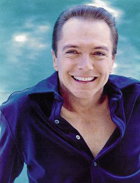
Rock Cellar Magazine
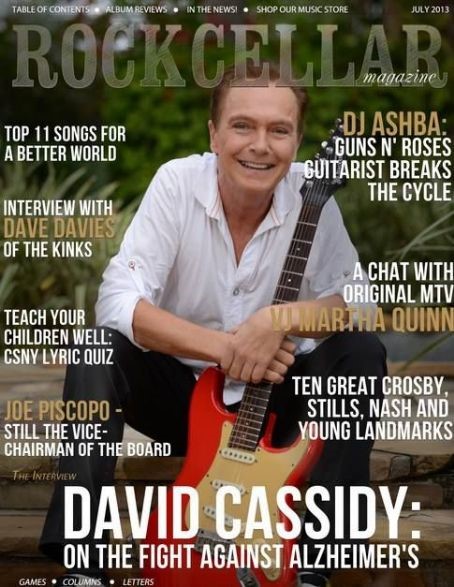
David Cassidy Opens Up Ė The Interview
Fighting the Battle Against Alzheimer's and Alzheimer's-Related Dementia
July 2013
By Ken Sharp
According to the Alzheimerís Association, in 2013 ď1 in 3 seniors are dying from Alzheimerís or another form of dementia.Ē Today, the startling figures are in: more than five million people are afflicted with Alzheimerís disease. And sadly, for renowned singer/actor David Cassidy, this has hit close to home.
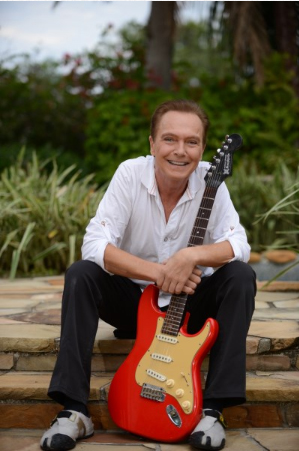
Tragically, his mother, veteran Broadway star Evelyn Ward, was afflicted with Alzheimerís-related dementia and bravely battled the disease for many years before succumbing at age 89 in December 2012.
Since then, Cassidy, partnering with the Alzheimerís Association of America, has become an impassioned spokesman and crusader helping to raise awareness, funds and educate about Alzheimerís and Alzheimerís-related dementia.
Rock Cellar Magazine spoke with David Cassidy, who shared his very personal and heartbreaking experience dealing with his motherís dementia, the immeasurable challenges this country faces over these deadly diseases and most importantly, what we as compassionate citizens can do to help.
Rock Cellar Magazine: Give us the back story on how you became involved with the Alzheimerís Association. You have a very personal reason for your involvement, as your mother Evelyn Ward was afflicted with Alzheimerís-related dementia.
David Cassidy: When youíre affected by something as dramatic and as personal as something like this and youíre the only childĖbasically other than my son, youíre the only living relative that knows herĖyouíre exposed to something that is very emotionally difficult. My mother was diagnosed with dementia, which is very similar to Alzheimerís.
When someone disappears in front of your eyes and every time you see them, thereís less and less and less of them, itís heartbreaking.
They canít talk, they canít walk, they canít go to the bathroom, they canít move without assistance. Itís very very disheartening and disturbing. And I wailed like a little baby when it hit me. I was at the facility with her and I realized my mom was gone and there was no coming back. Thereís no cure. Then I began to look at the realities of our culture, which is the largest percentage of our population in America are baby boomers.
Thatís 87 million people. The eldest reached 65 years old, which used to be the retirement age in 2011 but because weíre all living until weíre 85, 90 years old, the longer weíre living the more people will be afflicted with Alzheimerís and dementia. Now itís the sixth leading cause of death in the United States.
People need to realize that weíre truly at the point of an iceberg of such a magnitude where Alzheimerís and dementia will be the first or second leading cause of death in the next ten to fifteen years.
Thatís what itís gonna be.
RCM: When did you notice the first signs of your motherís disease?
DC: It was a long time ago. My mom was always kind of ditzy and when I say ditzy, she was never stupid but she would forget things all the time. So it took me longer than most to realize she had a problem. My son Beau said to me that Nana, his grandmother, is really forgetful now. Beau would stay for a weekend with her and Iíd say, ďOh, sheís always been like that.Ē I didnít even consider it. It wasnít even something I thought about.
A couple of years later she married a beautiful person who was her third or fourth cousin, a veteran and POW of World War II. I urged her to marry him because they had benefits for one another. Theyíd been living together platonically for fifteen years. I said, ďMom, you donít need to get married for romantic reasons, just do it for the right purposes. You love one another, you care about one another, and youíre companions with one another.Ē Finally a year before she passed away they officially got married. They were great partners and cared about each other. Her husband, Al was physically very poor but mentally completely sound and she was physically very good but mentally losing it. He could cover for her.
People often refer to others as becoming senile. Thatís not it at all. There is no senility, itís called Alzheimerís or dementia and itís a disease that the older we live more and more people are going to suffer from Ė and in my opinion no one will be able to avoid being affected by it.
RCM: What are you doing to raise awareness?
DC: Well, ultimately what we must realize is we donít have enough facilities for care. More importantly or as important, we donít have enough caregivers. Alzheimerís and dementia is one of the more tragic things that can happen to a human being whoís lived a full life and has been a vital, functioning wonderful contributing citizen. But once the disease takes hold they become more and more insular and they become more and more afraid and lose contact with the rest of the world. Because of her age, many of her friends have passed away, so my Mom only knew a couple of people and then basically her mind disappeared.
RCM: Seeing your mother battling this disease must have been emotionally difficult. How were you able to handle and help her manage the situation?
DC: You become the parent. Iíve taken care of my mother for many many years. Besides there not being enough caregivers and facilities for Alzheimerís and dementia, it costs a lot of money for proper care. You have to be fairly wealthy and well off so you can afford to pay ten, eleven, twelve thousand dollars a month to take care of an elderly parent. 20 or 30 years ago, they had what they called the ďSandwich GenerationĒ, when youíre taking care of your elderly parents Ė and because you had children fairly late in life, youíre taking care of your kids and putting them through college too.
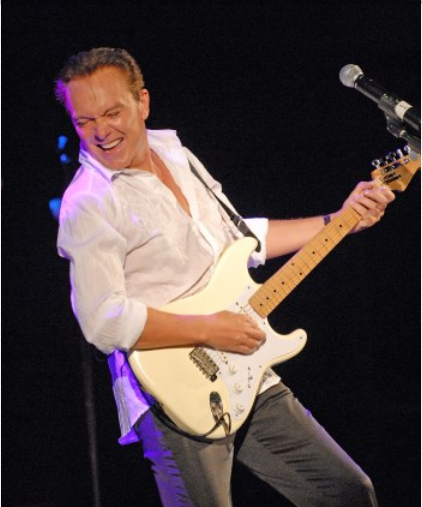
You have to be really successful to take care of an elderly parent afflicted with this disease because itís incredibly expensive. What Iím concerned about is most of the people in our country do not have the financial resources that Iím fortunate to have, which enabled me to take care of my mom. I was able to give her 24-hour nursing care.
Going through this is the most heartbreaking experience anybody could ever watch.
In my case, watching my only parent disappear and become completely helpless has been devastating. Mark my words, this will be the conversation that is going to happen in five years more than any on the radio, talk shows, newspapers, magazines and television. In ten years itíll be the main discussion of every media outlet and be the number one cause of death because the largest percentage of our population, as I told you earlier, are aging and theyíre falling apart because human beings used to live 40, 45, 50 years. 90 years? Really? Thatís where this disease becomes so prevalent. Itís expected. What happens to your body is everything shrinks. Your muscles shrink, your brain shrinks and it becomes less and less effective.
RCM: How can people help?
DC: The answer is to be proactive, and if youíre not now, you will be at some point and thatís a fact. It may take a year and it may take ten but everyone that you know who lives to 80, 85, 90 years old will be affected.
So you need to be proactive, you need to make other people aware. Stop being judgmental about looking at old crazy Uncle Eddie who we thought was senile.
No, heís not senile; he either has dementia or Alzheimerís.
RCM: In dealing with someone battling the disease, youíve cited the importance of ďcompanionship is essential; keeping them present and beingĒ.
DC: Thankfully that was something I was able to do for my mom. I had a very good friend who Iíve known since I was a teenager and she knew and loved my mom. I asked her if she would consider being a companion and twice a week going over and spending a few hours with my mom. Just to make sure she was being taken care of properly and also to be there for her. She graciously agreed and wouldnít accept payment because thatís what friends do for other friends. So she did help out and I insisted on paying her but she was so kind and compassionate she would have done it for nothing.
RCM: Is there anything that can be done for prevention?
DC: Yeah, there are a number of things that can be done.
Diet is important. Exercise. Using your brain. Doing things like crossword puzzles. Itís really important to keep your brain active.
Itís like anything else, ďIs there anything I can do for my poor sad ass body?Ē Yeah, go and start exercising, start doing weights. Use it or lose it. Itís not a guaranteed that you wonít get Alzheimerís of dementia but it can delay it. Do you know the youngest person whoís had Alzheimerís? Do you know how old they are?
RCM: No.
DC: Under 25. If you think about that concept, itís a terrible thing. By your mid to late Ď60s often times the disease becomes very very evident in many people and sometimes it takes a lot longer, sometimes it happens earlier. Thereís no way to know.
RCM: What are you doing personally in terms of prevention?
DC: I live a very clean and healthy lifestyle. I exercise and my diet is good. I weigh the same as Iíve weighed in the past 35 years other than five pounds. But Iíve always had a good diet. So exercise and diet are a big part of it and awareness is what Iím also trying to help with. Yes, we need funds because thereís not gonna be enough facilities for the baby boomer generation, which for me at age 63, Iím a part of.
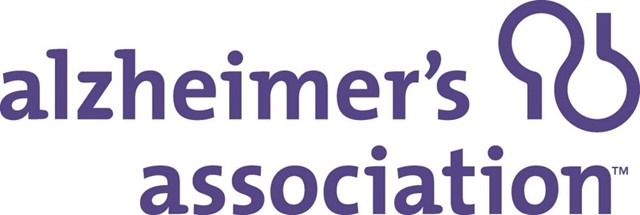
Go to www.alz.org to learn more and donate.
RCM: Has the government intervened to help?
DC: Thanks to Obama, heís begun to become aware of it. Obama is the most proactive and concerned person that comes to this cause. And the next President, whoever that will be, will have to be a lot more concerned about it because itís gonna be a big part of what theyíll have to be dealing with. I think the government gave us a million dollars last year and theyíre gonna give us five million dollars next year, which makes a difference. But itís still a drop in the bucket when you consider we have 87 million baby boomers who may be afflicted by the disease. Itís a start but thereís so much more to be done.
RCM: Tell us about the recent Julienís auction of your í70s memorabilia, which raised a significant amount of money for the cause.
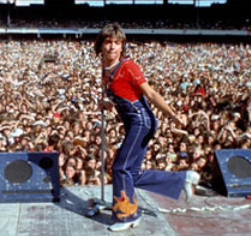
DC: I auctioned off some of my memorabilia, quite a few items that were very personal and also very public Ė my costumes, my guitar. There was something that I auctioned which was a big one for me and I thought that my fans might really like to have it. It was a telegram from my godmother to my Dad who was on a ship performing at the time and the telegram about my birth said, ďOn April 12th, 1950, mother and son are doing well.Ē Iíd forgotten about it and hadnít seen it for over 40 years. So I auctioned that off, I auctioned off a guitar, I auctioned off a number of my early jumpsuits and outfits that I wore in the Ď70s and thankfully they brought in many thousands of dollars and I was very happy about that.
*Click here to watch a news recap of the Julienís auction*RCM: What advice can you give to those faced with helping a spouse/family member afflicted with Alzheimerís or dementia?
DC: My mother was in care for seven years and she was pretty much all gone for the last four years.
My advice for those dealing with this terrible disease is you need to tell your loved ones over and over again how much you love them and how beautiful they are.
Thatís all I would ever say to my mom. I was her only son and she didnít have anyone else to be with so all I would ever tell her was, ďYouíre so beautiful Mom, I love you so much. I love you so much. I love you so much.Ē It was the truth but Iíd repeat it over and over and over again for her. Even though it might sound so ridiculously redundant to say ďI love you mom, I love you mom, I love you momĒ over and over, I did it because I didnít know when or if it would penetrate. I was with her when she passed away. I felt relief when she passed away.
It had to do with seeing your mother live in a diaper, seeing your mother not able to talk or walk and be virtually catatonic. For me, it was a beautiful thing that she finally passed because she was so healthy. Thatís something I struggle with a lot. ďGod, why wonít you take my mom? She has no life anymore. Please take her out of her mental misery as a human being.Ē There are a lot of people who have a problem with that one. Some say, ďOh no, sheís a living person.Ē
She canít feed herself, she canít talk, she canít walk, and she has no quality of life whatsoever. She sleeps 18 hours a day. It was a relief but it was so devastating for me. Why? Iíd already lost my dad years ago. Iíve talked to a lot of my contemporaries who lost their last living parent and theyíve lost their minds. They felt, ďOh my God, Iím alone in the world.Ē
Iíve always been alone in the world because I didnít have any brothers and sisters.
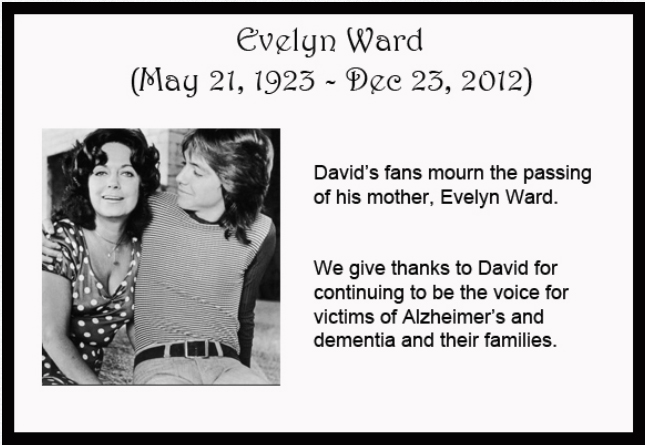
My brothers are my half-brothers; I never grew up with them so it wasnít like that for me. Iíve always been really independent and really strong and really great by myself. It made me realize why some of my friends who have lost their last parent were feeling like they were drifting on the ocean without a life raft.
I understood that for them but because Iíve been so used to being the caretaker, itís been a part of my life that I enjoyed doing because I love giving to other people and I only have one mom who I took care of for over 25, 30 years.
Itís really important that we talk about Alzheimerís and dementia now because in the next few years itís gonna be such an issue. We need money and we need facilities and care givers. There are a lot of people that are alone that would like to contribute to our society.
They need to contact the Alzheimerís Association so they can help as well as educate them about the disease.
For more information and to contribute to the cause, visit the Alzheimerís Association website www.alz.org
